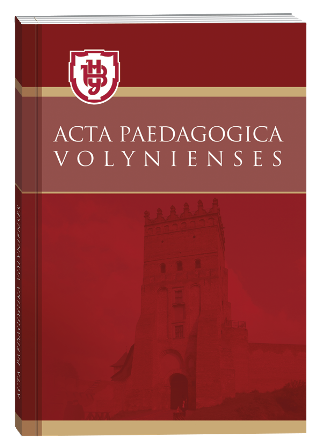СУЧАСНІ ОСНОВИ ІНШОМОВНОЇ ОСВІТИ МАЙБУТНІХ ФАХІВЦІВ У ЄВРОПЕЙСЬКОМУ ОСВІТНЬОМУ ПРОСТОРІ
DOI:
https://doi.org/10.32782/apv/2022.5.5Ключові слова:
іншомовна освіта, лінгвопедагогіка, майбутні фахівці іноземних мов, Європейський Союз, Україна, освітній процес, професійні компетентностіАнотація
У статті на основі аналізу наукових студій сучасних дослідників та діяльності закладів вищої освіти в країнах Європейського Союзу і України обґрунтовано актуальність і доцільність підготовки майбутніх учителів/ викладачів іноземних мов на засадах лінгвопедагогіки. Розкрито їх роль у створенні сприятливого іншомовного освітнього простору для безпосереднього спілкування суб’єктів процесу навчання (викладач і студенти, викладач і студент, студент – студенти, студент – студент) та залучення до нього носіїв мови і сучасних педагогічних технологій з метою формування навичок міжкультурної комунікації та набуття професійних компетентностей здобувачами освіти. Проаналізовано зміст загальнопедагогічних і лінгводидактичних дисциплін як основи теоретичної, практичної та дослідницької підготовки майбутніх фахівців іншомовної освіти в університетах Польщі, Чехії й України та вдосконалення їх навичок усного і писемного спілкування в полікультурному середовищі. Констатовано, що в цьому багатоаспектному процесі, заснованому на положеннях Загальноєвропейських Рекомендацій з мовної освіти, кожна держава-учасниця Європейського Союзу враховує національні традиції і досвід навчання іноземних мов, досягнення світової лінгвопедагогіки, індивідуальні запити і потреби своїх громадян, наявність досвідченого науково-педагогічного потенціалу. З’ясовано, що вивчення дисциплін педагогічного та лінгводидактичного циклів сприяє формуванню у майбутніх фахівців ґрунтовних теоретичних знань, розуміння процесів розвитку, соціалізації, виховання та навчання зростаючих громадян Європи, набуттю професійних компетенцій для успішної діяльності в Європейському освітньому і науковому просторі.
Посилання
Гаманюк В. А. Теорія та практика іншомовної освіти у Німеччині в контексті загальноєвропейських інтеграційних процесів: дис. доктора пед. наук: 13.00.01. Луганськ, 2013. 247 с.
Загальноєвропейські рек-ї з мовної освіти: вивчення, викладання, оцінювання. К. : Ленвіт, 2003. 273 с.
Нетреба М. М. Зарубіжний досвід викладання англійської мови в європейських країнах. Освітній менеджмент: теорія і практика : зб. наук. пр. Маріуполь : МДУ, 2020. с. 78–86.
Program Studiow Wyzshych rozpoczynajacych sie w roku akademickim 2018/2019. URL: FIL-ros.– stopien_2018_2019.pdf-Foxit-Reader (дата звернення 11.10.2022).
Uniwersytet Marii Curie Sklodowskiej w Lublinie. URL: https: www.fil.umk.pl/panel/wp content/uploads/germanska_s2_1617.pdf (дата звернення 10.10.2022).
Univerzita Karlowa. Studium, predmety. URL: https://is.сuni.cz/studium/predmety/ index.php?do=prohl Scfak=11410 Sc oborplan=ODMAAJD Sc vy uc=OSc. oborsims=Sc fbclid=1 (дата звернення 11.10.2022).







